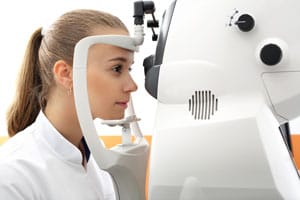National Eye Health Week 2021

Date
Location
Search Awareness Days
What is National Eye Health Week?
National Eye Health Week takes place in the UK in the last full week in September every year and promotes the importance of good eye health and the need for regular eye tests for all. It is organised by Eye Health UK. This year the event will be held from Monday-Sunday, 20-26 September 2021.
The 2019 event had the positive impact of 60% of opticians saying they saw an increase in sight tests in and around the Week.
There are around two million people living with sight loss in the UK. Of these, around 360,000 are registered as blind or partially sighted. Furthermore, eyesight is one of the major senses people fear losing the most.
The week is more of an awareness campaign than fundraiser and encourages people to get involved and spread the word. First of all: get your eyes tested!
The charity provides lots of resources to download and ideas of how to get involved.
Reasons for Sight Loss
There are several common reasons for sight loss, Many of them are preventable and oddly, masturbation isn’t one of them (thankfully or I would have been blind long ago LOL).
Top of the list is age related macular degeneration (ARMD). This is the UK’s leading cause of blindness affecting an estimated 600,000 people.
Retinitis pigmentosa (RP) is the name given to a group of inherited diseases of the retina that all lead to a gradual progressive reduction in vision. Approximately 1 in 3-4,000 people have this.
Glaucoma is the name for a group of conditions which affect the optic nerve and affects two in every 100 people over the age of 40.
Cataracts are the clouding of the eye’s natural lens. It is the most common cause of vision loss in people over age 40 and is also the principal cause of blindness in the world.
Diabetic retinopathy affects the blood vessels supplying the retina, the part of the eye which is sensitive to light and very important to vision. It is the leading cause of preventable sight loss in the UK.
Why Is A Sight Test or Eye Test Important?

A sight test is not simply a test to see if you require glasses or need to change your glasses. A sight test can also detect other illnesses and complications such as diabetes or high blood pressure or some of the symptoms described above.
A sight test only takes 30 minutes or less. From experience (as a Type 1 diabetic) the nurse or optometrist will drop some eye drops into your eye to dilate the pupils. It stings a little but you return to the waiting room for 10 minutes for the solution to settle.
You then return to the optometrist and sit in front of the machine, placing your chin on a rest and looking straight into the box. The camera takes four shots or so and bingo! The job’s a good’un.
Can I Get a Free Eye Test on the NHS?
Many high street opticians offer free eye tests in England and Wales if you subsequently purchase a pair of glasses but in Scotland eye examinations are free on the NHS.
The NHS in England provides free eye tests for various categories of patient. These are people who:
- Are under 16
- Are 16, 17 or 18 and in full-time education
- Are 60 or over
- Are registered as partially sighted or blind
- Have been diagnosed with diabetes or glaucoma
- Are 40 or over and your mother, father, sibling or child has been diagnosed with glaucoma
- Have been advised by an eye doctor (ophthalmologist) that you’re at risk of glaucoma
- Are a prisoner on leave from prison
- Are eligible for an NHS complex lens voucher – your optician can advise you about your entitlement
- Are on various levels of income support
According to Eye Health UK:
- 2 million people in the UK are living with sight loss that is severe enough to have a significant impact on their daily lives. Half of this sight loss is avoidable
- A sight test can detect early signs of conditions like glaucoma, which can be treated if found soon enough
- During a sight test, other health conditions such as diabetes or high blood pressure may be detected
- For healthy eyes, eat well, don’t smoke and wear eye protection in bright sunlight
How Many People are Registered as Blind or Partially Sighted in the UK?
As of 2014, there are around 350,000 people registered as blind or partially sighted in the UK. This is approximately 290,000 in England; 16,500 in Wales; around 8000 in Northern Ireland and 34,000 in Scotland (2010 figures).
In their State of the Nation Eye Health 2017: A Year in Review report, the RNIB notes:
- Every day 250 people start to lose their sight in the UK
- 1 in 5 people will live with sight loss in their lifetime
- Sight is the nation’s most precious sense by far; 10 times more people (78 per cent of people) said sight was the sense they fear losing most compared to the next most popular sense, smell (8 per cent), followed by hearing (7 per cent)
- Almost a quarter of people are ignoring the first signs of sight loss; despite not being able to see as well in the distance or close up as they used to, 23 per cent have not sought advice from an optician or medical professional
- More than 80 per cent of people are not aware that an optician can spot the early signs of cardiovascular disease, the leading cause of death in the UK
- Research suggests Brits check their teeth more often than their eyes; 42 per cent visit the dentist once every six months (equating to four times over two years) while 25 per cent of UK adults haven’t had an eye test in the past two years or at all
Frequently Asked Questions on Eyesight
How Often Should You Get Your Eyes Tested?
An eye test is recommended every two years for people with healthy eyes and should be part of one’s general healthcare just like going to the dentist (which reminds me …)
How to Improve Your Eyesight
We’re not talking about Superman’s x-ray vision or shooting lasers out of our eyes (yet) but there are ways to improve and maintain your vision.
While practicing in the nets will improve your cricket and going to the gym can build your muscles is there anything you can do to improve your eyesight?
This refers to people with generally good eyesight. If you’re suffering from one of the conditions above then you need medical attention.
According to Nvision there are several ways you can prevent your eyes from damage:
- Eat a balanced and healthy diet rich in antioxidants and vitamin A
- Get enough sleep
- Protect your eyes from the sun
- Wear eye protection when doing anything that could potentially lead to eye injury
- Take breaks from screen time
- Get regular eye tests
- Don’t smoke
- Practice good hygiene
- Stop masturbating (no, I just added that)
Does Eating Carrots Improve Your Eyesight?
Can carrots improve your eyesight? Yes, under certain conditions. There is evidence to suggest that eating carrots does help improve your eyesight. “The body uses beta-carotene to make vitamin A, and vitamin A helps the eye convert light into a signal that can be transmitted to the brain, allowing people to see under conditions of low light.”
Does Masturbation Affect Eyesight?
It doesn’t seem to have affected me, but I do wear glasses ? I think it’s an old wives’ tale.
Eyesight Facts and Figures
According to the Royal National Institute for the Blind (RNIB) as of 2017, there are around 350,000 people on the registers of blind and partially sighted people in the UK. A total of 173,735 are registered severely sight impaired and 176,125 are registered sight impaired.
Furthermore, their findings found:
- In 2013 there were an estimated 1.93 million people living with sight loss in the UK
- The number of people living with sight loss is increasing each year and is set to double by 2050
- Sight loss places a large economic cost on the UK, totalling an estimated £28 billion in 2008
- Direct health care system costs amount to £3 billion
